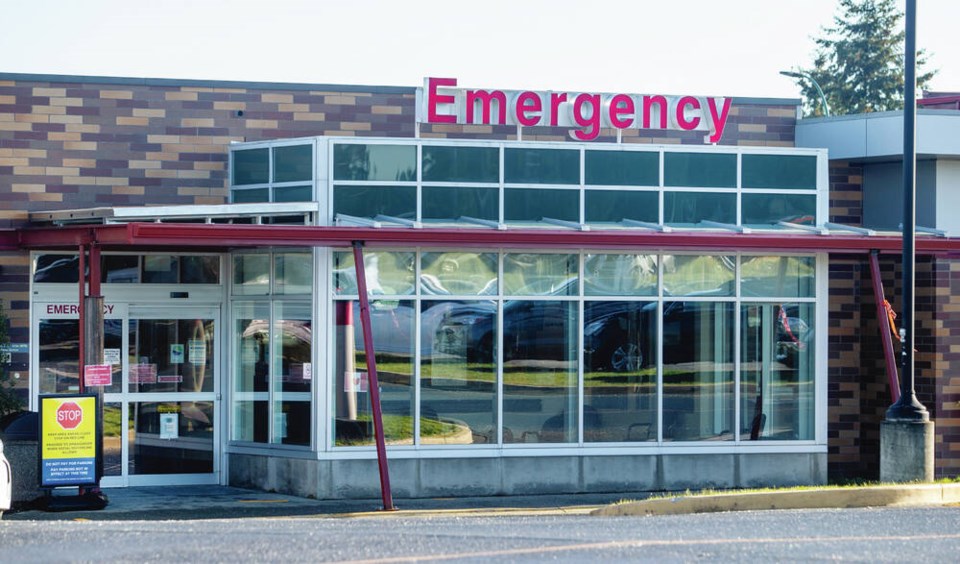Island Health is looking for a physician assistant — one of the first in the province — to work in Saanich Peninsula Hospital’s emergency department, which has been closed overnight since last July because of a staff shortage.
Physician assistants, who work under a physician supervisor, are common in other provinces, but are new to B.C.
While it’s being hailed as a significant step, it won’t yet see the hospital’s ER reopen overnight. A job posting says the physician assistant will provide five-day-a-week care in a team-based environment in the emergency department, with night shifts “probable in the future.”
Last year, physician assistants ramped up their fight to be licensed in B.C. amid a widespread doctor shortage.
The B.C. Health Ministry began consultations on the idea in the fall as a joint initiative with the College of Physicians and Surgeons.
Health Minister Adrian Dix said a physician-assistant pilot project will begin in the Central Saanich hospital’s emergency department, with the possibility of expanding to other ERs in the province in the future.
“Saanich Peninsula Hospital will be one of the first to hire one, which is really significant for the people in that community, but also for Vancouver Island,” Dix said.
A physician assistant typically trains in a master’s degree program — 12 months in class and 12 months or about 2,000 clinical hours under a physician.
Saanich Peninsula ER physician Dr. Jeff Unger said it’s hoped the program will roll out in April.
“It will be the first time working with PAs for most of us, and so there is a lot of behind-the-scenes preparation going on, too,” said Unger, who called the addition of PAs in the B.C. health care system “incredibly important.”
Ideally, he said, it will help alleviate strain on emergency departments by “working alongside us and efficiently assessing and treating patients, reducing wait times, and ensuring that individuals receive appropriate timely care.”
Unger said Saanich Peninsula Hospital has been dealing with escalating patient demand and complexity that has outstripped physical space and human-resource capacities over the past few years.
With additional nurses, unit aides, respiratory therapists and lab resources also needed, the PA position alone will not permit the emergency department to reopen overnight, he said.
The PA pilot will begin with daytime care and likely take several months to assess and review its impacts, said Unger.
Lisa Stewart, director of the B.C. division of the Canadian Association of Physician Assistants, called the launch of the pilot “a monumental moment.”
The Health Ministry, college and health authorities “did an immense amount of work in a relatively short period of time to come to this place of finally posting the first job post for Island Health and Saanich Peninsula,” Stewart said.
“We’re extremely thrilled about this and we just hope it sets the tone for ongoing growth for the profession in the province.”
Stewart said about 30 physician assistants are in the province. Only about 13 are working full-time, with the Canadian Armed Forces, which has used physician assistants for about half a century.
The remaining PAs in the province commute to work elsewhere in Canada or the United States, while others have found jobs in the province in other fields.
Not all PAs are experienced working in emergency rooms, said Stewart — some may have expertise in primary care or surgical care.
Physician assistants are already licensed to practise in New Brunswick, Nova Scotia, Ontario, Manitoba, Alberta and Saskatchewan.
Four universities train PAs in Canada. Three or four more are planned, at the University of Calgary, University of Ottawa, University of Saskatchewan and in Quebec.
There are more than 1,000 physician assistants across Canada, said Stewart, and about 168,000 working in the U.S.
Dr. Charles Sun, a staff physician at Westshore Urgent and Primary Care Centre who has worked with and helped train physician assistants and advocated for the pilot project, said while working under the supervision of physicians, physician assistants can perform patient exams, order laboratory and diagnostic tests, prescribe medications, manage treatment plans, and advise patients on preventative health care.
Stewart said PAs will bolster the province’s aim to build out team-based care in hospitals and communities.
She said the Health Ministry is being wisely strategic in first opening the door in emergency departments to “try and carve out a niche for physician assistants,” but as the program unfolds, she’d like to see it expand to surgical roles in hospitals and into primary care in the community.
“We think expanding the role beyond emergency departments as well as introducing a PA school will only further the profession and B.C.’s commitment to the program,” Stewart said.
“It’s really is going to be an investment the province is going to have to make to grow our own PAs and develop our own profession internally.”
There is no current formal proposal for a training program in B.C., which Dix has said is “one of the issues we’re looking at.”
>>> To comment on this article, write a letter to the editor: [email protected]




